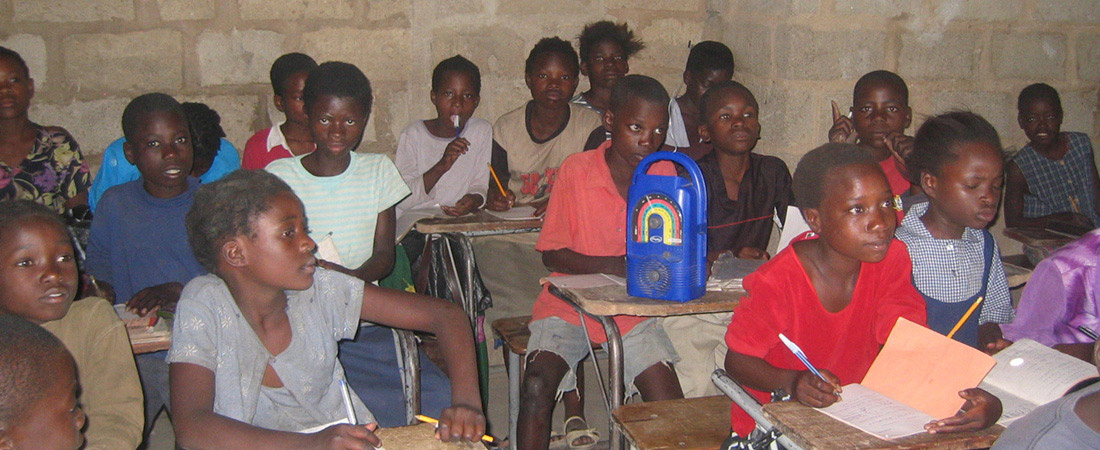Just Back: Simon Richmond

Participants of Malawi Interactive Radio Instruction program
Simon Richmond recently returned to the United States after years of leading EDC work in Malawi and Zambia. Richmond specializes in using educational technologies such as radios and iPods to enhance learning in remote communities. In his new role at EDC, he lends wider support to international projects that are experimenting with new learning technologies.
“I was 10 when my family moved to Zimbabwe, shortly after the War of Independence. Some of my classmates had scars, and some had seen family members die. We lived deep in the bush, outside Nyanga, and my parents sent us to the local government school. We were the first white children to attend, and the other children weren’t sure what to make of my sisters and me. But each day I brought in a Frisbee or Nerf ball or something novel to play with—something they had never seen before—and soon we were able to just be kids.
Growing up, I wasn’t sure what I wanted to be, but I remember thinking two things were certain: I could never be a doctor—because I fainted at the sight of blood—and I could never be a teacher. Both my parents were teachers, and they’d come home with armloads of student books to be graded. I remember thinking, ‘If being a teacher involves this much work, then forget it.’ But education is such a rich, challenging environment, with so many opportunities to be of service.
When I was in grad school in the late 1990s, online education was just taking off. Working as a graduate assistant, I became interested in educational technology when my professor asked me to put his class online. We started doing it just two weeks before the semester began—crazy, but we pulled it off. That was the beginning of my being thrown into the deep end of educational technology—but I guess with technology, you never really get out of the deep end.
Growing up in Zimbabwe shaped me as an educator. It taught me firsthand the values that were important to my parents—the oneness and equality of humanity and the importance of appreciating cultural differences. It made me interested in going back to Africa, but it also built up a sense of obligation to be of service to the developing world.
In 2002, I took an internship with EDC on a project called Taonga Market, in a remote area of Zambia. We helped communities open schools in churches or in structures they built, and we broadcast interactive radio instruction [IRI] to them. By the time I left, we had built a listenership of 80,000 out-of-school children, all of whom would have fallen through the cracks otherwise.
Through Taonga Market, we found that the volunteer teachers often didn’t understand the content they were supposed to teach. So we developed a series of audio and video training resources that went hand in hand with the IRI lessons, and loaded the enriched package onto iPods. Teachers would watch the training materials at home the night before, and then teach the corresponding IRI lessons the next day.
Malawi asked us to create a similar program for them. I was there for three years with Tikwere!. They invited us into mainstream schools so our audience was much larger—we currently have about 2 million daily listeners there.
There is a lot of buzz around technology in education: cell phones, one laptop per child, and tablet PCs. The technology is getting cheaper and, just as importantly, less power hungry. Soon we will be able to deliver interactive multimedia into classrooms in the developing world. It’s an exciting time.
I think it is important to focus on the hardest parts of ICT-based education: developing the content and creating a social context around the learning experience. In many ways, the hardware is the easy part. And now that the hardware is catching up to the needs of the environments we work in, we can continue developing exciting learning formats.
Looking back on EDC’s work in Africa, I’m proud of the number of kids we reach every day. I think about how each day the Tikwere! radio broadcasts go out to so many kids in Malawi. They’re learning new things, and their test scores are improving. It’s a very tangible impact we’re having on a whole generation—a national population of kids. That gives me a great sense of pride.”